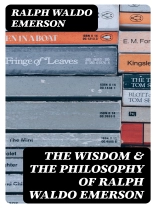In ‘The Wisdom & The Philosophy of Ralph Waldo Emerson, ‘ the author delves deeply into the intricate philosophy of self-reliance, nature, and the spiritual undercurrents that define Emerson’s oeuvre. This collection not only encapsulates Emerson’s transcendentalist ideas but also elucidates his profound reflections on individuality, society, and the interconnectedness of all living things. The book’s literary style is characterized by eloquent prose and vivid imagery, reflective of the 19th-century American literary renaissance, which situated Emerson as a pivotal figure in the development of modern thought. Through this comprehensive examination, readers are invited to explore the themes of intuition and the inherent goodness of both people and nature that permeate Emerson’s writings. Ralph Waldo Emerson (1803-1882) was a philosopher, essayist, and poet whose intellectual journey was deeply influenced by the changing landscapes of American society and his transcendental beliefs. He emerged as a leading voice in the transcendentalist movement, advocating for a deeper connection with nature and a more profound understanding of the self. His experiences, including a dissatisfaction with organized religion and a search for personal truth, shaped his writings and reinforced his commitment to fostering intellectual independence. This enriching work is highly recommended for those seeking to understand the essential tenets of Emerson’s philosophy and the enduring relevance of his wisdom in contemporary society. Whether you are a scholar, a student, or simply a curious reader, this book will inspire transformative thoughts and encourage a closer examination of your own beliefs and ideals.
Despre autor
Ralph Waldo Emerson, born on May 25, 1803, in Boston, Massachusetts, stands as a towering figure in American literature and philosophy. An eminent essayist, lecturer, and poet, Emerson led the transcendentalist movement of the mid-19th century, advocating for individual intuition as a guiding moral force and emphasizing a close relationship with nature. Widely recognized for his doctrine of self-reliance, Emerson’s work has deeply influenced thinkers, writers, and poets both in America and abroad.
His seminal essay collections, ‘Essays: First Series’ (1841) and ‘Essays: Second Series’ (1844), address critical aspects of human existence with a balance of accessible prose and philosophical depth. These essays, along with notable lectures such as ‘The American Scholar’ (1837) and ‘Nature’ (1836), not only serve as foundational texts for transcendentalism but also mark Emerson’s legacy as a champion of individualism and intellectual independence. Emerson’s ‘The Wisdom & The Philosophy of Ralph Waldo Emerson’ encapsulates the essence of his thought, reflecting his beliefs in the endless potentials of the human spirit and the inherent goodness of the individual. His literary style, blending poetics with crisp, aphoristic insights, reveals a mind in constant pursuit of truth and a heart in search of universal harmony. Emerson passed away on April 27, 1882, in Concord, Massachusetts, leaving behind a rich intellectual heritage that continues to inspire and challenge.












